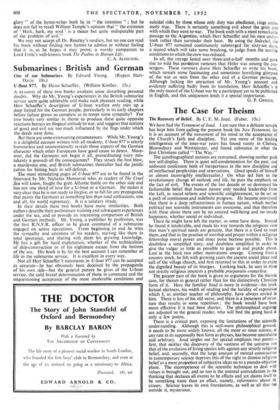Submarines : British and German
U-Boat 977. By Heinz Schaeffer. (William Kimber. 15s.) A READING of these two books awakens some disturbing personal doubts. Why do Mr. Young's experiences in the British submarine service seem quite admirable and make such pleasant reading, while Herr Schaeffer's description of U-boat warfare only stirs up a deep hatred for the German people, particularly in its early chapters before failure grows so complete as to tempt some sympathy? For two books very similar in theme to produce these quite opposite reactions betrays an illogical attitude to war, and suggests that notions of good and evil are too much influenced by the flags under which the deeds were done.
But there are some extenuating circumstances. While Mr. Young's is a delightful account written with all modesty, U-boat 977 is utterly humourless and unintentionally reveals those aspects of the German character which other Europeans have good cause to detest. More- over, did the Germans not begin it all, premeditating (very mis- takenly it proved) all the consequences? They struck the first blow, a murderous one, and British submarines thereafter had the justifi- cation for hitting back in self-defence. The most stimulating pages of U-boat 977 are to be found in the foreword by Mr. Nicholas Monsarrat who, as readers of The Cruel Sea will know, fought the grim Atlantic battle on the other side and has not one shred of love for a U-boat or a German. He makes it very clear that he is not ready to forgive, or to fall for any propaganda that paints the Germans as something less than total enthusiasts, one and all, for world supremacy. It is a salutary tirade. In their details these two books have many similarities. Both authors describe their preliminary training and subsequent experiences under the sea, and so provide an interesting comparison of British and German methods. Mr. Young, a publisher by profession, was the first R.N.V.R. officer to be given command of a submarine engaged on active operations. From beginning to end he wins the sympathy and attention of his readers, starting like them in total ignorance, and sharing with them his growing knowledge. He has a gift for lucid explanation, whether of the technicalities of ship-construction or of his nightmare escape from the bottom of the sea. His book is by far the best account I can remember of life in the submarine service. It is excellent in every way.
Not all Herr Schaeffer's statements in U-boat 977 can be accepted as accurate—he has obviously been deceived by the propaganda of his own side—but the general picture he gives of the U-boat service, the cold brutal determination of those in command and the unquestioning acceptance of the most intolerable conditions and suicidal risks by those whose only duty was obedience, rings omin- ously true. There is certainly something evil about the grim zest with whidh they went to war. The book ends with a most remarkable passage to• the Argentine, which Herr Schaeffer and his men under- took rather than surrender their boat. By using the Sndrchel, the U-boat 977 remained continuously submerged for sixty-six days, a record which will take some breaking, to judge from the terrible conditions to which the crew was reduced.
In all, the voyage lasted aver three-and-a-half months and gave rise to wild but persistent rumours that Hitler was among the pas- sengers. These rumours drove Herr Schaeffer to write his book, which reveals some fascinating and sometimes horrifying glimpses of the war as seen from the other end of a German periscope. Although lacking ths attraction of Mr. Young's account and evidently suffering badly from its translation, Herr Schaeffer's is the only record of the U-boat war by a participant yet to be published in English, and this uniqueness lends it a special importance.
G. P. GRIGGS.


































 Previous page
Previous page